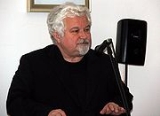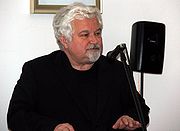
Petr Pithart
Encyclopedia

Czech Republic
The Czech Republic is a landlocked country in Central Europe. The country is bordered by Poland to the northeast, Slovakia to the east, Austria to the south, and Germany to the west and northwest....
politician, lawyer and political scientist.
He served as Prime Minister of the Czech Republic (then part of Czechoslovakia
Czechoslovakia
Czechoslovakia or Czecho-Slovakia was a sovereign state in Central Europe which existed from October 1918, when it declared its independence from the Austro-Hungarian Empire, until 1992...
) from February 6, 1990 to July 2, 1992. He has sat in Senate of the Czech Republic
Senate of the Czech Republic
The Senate of the Parliament of the Czech Republic , usually referred to as Senát, is the upper chamber of the Parliament of the Czech Republic...
since its inception in autumn 1996, serving as its chairman from December 18, 1996 to December 16, 1998 and from December 19, 2000 to December 15, 2004.
Political career
Pithart was member of Communist Party of CzechoslovakiaCommunist Party of Czechoslovakia
The Communist Party of Czechoslovakia, in Czech and in Slovak: Komunistická strana Československa was a Communist and Marxist-Leninist political party in Czechoslovakia that existed between 1921 and 1992....
since 1960, was active in the Prague Spring
Prague Spring
The Prague Spring was a period of political liberalization in Czechoslovakia during the era of its domination by the Soviet Union after World War II...
and left the party after the Soviet invasion; later he was one of the most prominent dissident
Dissident
A dissident, broadly defined, is a person who actively challenges an established doctrine, policy, or institution. When dissidents unite for a common cause they often effect a dissident movement....
s against the communist regime. He was imprisoned for this activity including being one of the first signatories of Charter 77
Charter 77
Charter 77 was an informal civic initiative in communist Czechoslovakia from 1976 to 1992, named after the document Charter 77 from January 1977. Founding members and architects were Václav Havel, Jan Patočka, Zdeněk Mlynář, Jiří Hájek, and Pavel Kohout. Spreading the text of the document was...
. In 1989 he was one of the prominent leaders of the Civic Forum
Civic Forum
The Civic Forum was a political movement in the Czech part of Czechoslovakia, established during the Velvet Revolution in 1989...
founded at the start of the overthrow of the regime
Velvet Revolution
The Velvet Revolution or Gentle Revolution was a non-violent revolution in Czechoslovakia that took place from November 17 – December 29, 1989...
. Having participated in the negotiations which led to the change of the federal, Czech and Slovak governments, he was appointed Prime Minister of the then Czech Socialist Republic.
Pithart is viewed by many as an indecisive philosopher and thinker, rather than a tactical or charismatic leader. While his 1990-92 Czech government is and praised for privatisation of major companies to direct foreign owners, he was not capable of dealing with the actions of the federal Minister for Finance Václav Klaus
Václav Klaus
Václav Klaus is the second President of the Czech Republic and a former Prime Minister .An economist, he is co-founder of the Civic Democratic Party, the Czech Republic's largest center-right political party. Klaus is a eurosceptic, but he reluctantly endorsed the Lisbon treaty as president of...
and his increasingly popular Civic Democratic Party nor growing Slovak nationalism which led in the end to dissolution of Czechoslovakia
Dissolution of Czechoslovakia
The dissolution of Czechoslovakia, which took effect on 1 January 1993, was an event that saw the self-determined separation of the federal state of Czechoslovakia. The Czech Republic and Slovakia, entities which had arisen in 1969 within the framework of Czechoslovak federalisation, became...
as well as his defeated party, Civic Movement.
Finally, he failed in his bid to become President of the Czech Republic
President of the Czech Republic
The President of the Czech Republic is the head of state of the Czech Republic. Unlike his counterparts in Austria and Hungary, who are generally considered figureheads, the Czech President has a considerable role in political affairs...
in 2003, losing to rival Václav Klaus due to the government coalition's disunity as well as his unwillingness to do a deal with the Communist Party of Bohemia and Moravia
Communist Party of Bohemia and Moravia
The Communist Party of Bohemia and Moravia , abbreviated to KSČM, is a political party in the Czech Republic. It has a membership of 82,994 and is a member party of the European United Left - Nordic Green Left bloc in the European Parliament...
- a barrier which the more stridently public anti-communist Klaus had no difficulty ignoring or, subsequently, refusing to discuss.
He became a member of the Christian and Democratic Union - Czechoslovak People's Party
Christian and Democratic Union - Czechoslovak People's Party
The Christian and Democratic Union – Czechoslovak People's Party is a political party in the Czech Republic expressing Christian democratic views...
party and is currently first Deputy Chairman of the Senate of the Parliament of the Czech Republic.

